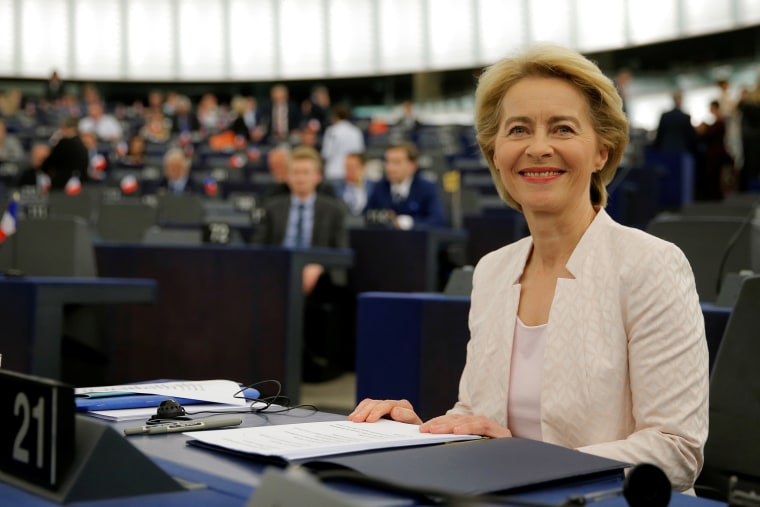LONDON — The European Union's executive body elected its first female president, Ursula von der Leyen, by a narrow margin on Tuesday in a move that could see more women rise to the top of political ranks on the continent.
Von der Leyen, 60, received just nine votes more than the 374 needed to lead the European Commission, one of the two most powerful E.U. institutions, which enforces policies for its 28-member states.
The former German defense minister — an ally of German Chancellor Angela Merkel and a favorite of French President Emmanuel Macron — was not initially a top candidate but put forward as a compromise after arduous negotiations among E.U. leaders. And her election is just the first of many hurdles ahead.
Gender equality
In her opening statement to the commission on Tuesday, Von der Leyen began by highlighting the triumph of having a woman finally take the top job. "We represent half of our population. We want our fair share," she said.
She vowed to bring greater gender equality to the commission by selecting an equal number of men and women to be commissioners. If member states fail to put forward enough female candidates, she warned, "I will not hesitate to ask for new names."
Of the 183 commissioners that have held office to date, less than 20% have been women.
Brexit deadlock
The issue most likely to dominate the commission's agenda in the immediate months is Britain's departure from the E.U.
The previous March 29 deadline to reach a deal between both parties was extended to Oct. 31, but discussions have been at a standstill following chaos within the British parliament and the awaited election of a new prime minister. Von der Leyen said she's open to further extend the withdrawal date "for a good reason."
She has previously said that the U.K. leaving without a withdrawal deal would be the "worst possible start" to the post-Brexit relationship — and on Tuesday she was steadfast in repeating the E.U.'s position that the withdrawal deal sealed by Theresa May would not be re-opened for discussion, despite loud calls in the U.K. for this to happen.
Among Europe's greatest Brexit concerns in ensuring a deal will be to protect the border between the Irish Republic and Northern Ireland, where many fear a no-deal scenario will spark violence.
Economic reform
Within Europe, Von der Leyen will navigate a series of economic reforms geared at establishing "social fairness" by boosting opportunities for young people and setting minimum wages across the bloc.
Corporate taxes will also be reformed to catch up with the increasingly globalized nature of business, clamp down on digital companies and tackle tax fraud.
Von der Leyen is also eyeing an improved trade partnership with the United States — the Trump administration threatened tariffs on E.U. imports only a year ago.
A trade deal would be part of a wider push to grow Europe's influence on the international stage. "I believe Europe should have a stronger and more united voice in the world — and it needs to act fast," she said.
Climate change
Von der Leyen announced ambitious targets of establishing a $1.1 trillion "Green Deal" for the continent within her first 100 days in office and lowering carbon emissions by 50% by 2030 with a scheme of investments and carbon taxes. "This is the greatest responsibility and opportunity of our times," she said.
The targets play to the wave of environmentalism within European politics, although it wasn't enough to earn the support of the Green party, which pointed to her lack of "concrete proposals to avert climate breakdown."
Security fears
Von der Leyen has also prioritized strengthening Europe's defense and security systems, but her critics may question whether her experience as defense minister in Germany will give her an edge on the issue. Her tenure was marred by scandals over the awarding of contracts, right-wing extremism within the country's armed forces and gaps in military readiness.
Von der Leyen said the North Atlantic Treaty Organization, a key alliance that includes the United states and defends the bloc from Russian aggression, will remain a cornerstone. Her plan also envisions a "more European" defense strategy with increased research and development capabilities, but did not include specific targets. She is known to be a supporter of the creation of an E.U. army.
Under Von der Leyen, the E.U. would strengthen role of Balkan members nations — geographically the closest member states to Russia — and would consider the addition of North Macedonia and Albania, which have both expressed an interest in joining.



